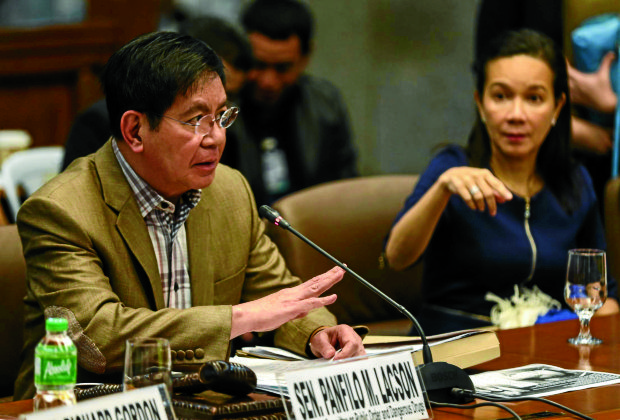
Senate probe on the death of Albuera Mayor Rolando Espinosa: Committee on Public Order and Dangerous Drugs chairman Sen. Panfilo Lacson with Sen. Grace Poe. INQUIRER PHOTO/LYN RILLON
“There’s one word to describe this: premeditated.”
That’s how Sen. Panfilo Lacson called the predawn police operation conducted by 19 officers of the Criminal Investigation and Detection Group (CIDG) of Eastern Visayas (Region 8) on Nov. 5 at the Leyte subprovincial jail in Baybay City, which led to the killing of Albuerra Mayor Rolando Espinosa and fellow inmate Raul Yap.
Espinosa, 54, had earlier executed an affidavit implicating Sen. Leila de Lima and 225 government, military, police and judicial personnel in the alleged widespread illegal drug trade operated by his son Kerwin, 31, tagged as the No. 1 drug lord in Eastern Visayas, according to authorities.
During Thursday’s hearing of the Senate committee on public order and dangerous drugs, Lacson had earlier described the slaying of Espinosa as a “clear case of extrajudicial killing”—a widespread concern in the war on drugs mounted by President Duterte after he took office on June 30.
Discrepancies
The committee, chaired by Lacson, heard testimony that at 3:49 a.m. on Nov. 5, the raiding team’s supervisor, Supt. Santi Noel Matira, called for forensic investigators to come, calling two offices to be sure, including the scene of the crime operatives (Soco). The team had been set to serve a search warrant on Espinosa, but did not enter the jail until 4:30 a.m.
Espinosa and Yap later turned up dead.
For Lacson, a former Philippine National Police chief, discrepancies between official logs and police testimonies could only mean one thing.
“You have not even entered [the jail premises], you were already requesting for a Soco team? Were you anticipating that you were going to kill someone?” he said. “It’s like you were calling for a funeral parlor when there is no encounter yet.”
Lacson noted that the timeline of Supt. Marvin Marcos, CIDG regional head, showed that the team entered the jail using a a bolt cutter at 4:30 a.m. This was after jail guards, who the raiders claimed were “uncooperative,” were disarmed.
PO2 Jennifer Monge of the Regional Tactical Operations Center recorded in her logbook a 3:49 a.m. call from Matira, requesting for Soco investigators. Matira had also called a police satellite office to make sure that a Soco team was on its way. The team arrived at 5:58 a.m.
CIDG officers struggled to explain the discrepancy, with Marcos saying entries in his timeline were just approximations.
Matira did not deny making the calls, but asserted he did this only when he was sure that Espinosa no longer had vital signs.
Coordination
PNP Director Benjamin Magalong said calling for a Soco team before a police operation was not part of standard procedures.
Lacson ordered Matira to surrender his mobile phone to Magalong for forensic examination. The officer refused, invoking his right against self-incrimination.
Several senators also noted how the raiding team had failed to coordinate the operation with higher officials, considering the involvement of a high-profile detainee such as Espinosa.
“Considering that [it involved] a high-profile target, it’s a high-profile operation, we have this protocol that commanders should always be informed,” Magalong said, adding that Marcos should have informed both the PNP regional head and the CIDG regional head.
The CIDG regional head, Chief Supt. Roel Obusan, and PNP regional head, Chief Supt. Elmer Beltejar, testified that the raiding team made no coordination of their mission, a point raised by Sen. Ralph Recto.
Shallow testimonies
The Leyte provincial jail warden, Homobono Bardillon, said he was not informed of the operation.
Chief Insp. Calixto Canillas Jr., officer in charge of the PNP Regional Maritime Group Unit, said he was merely asked if his unit wanted to join.
“I wasn’t born yesterday to believe your shallow testimonies,” Sen. Manny Pacquiao said in Filipino. “You cannot make a fool out of the minds of the people listening now.”
At one point, Pacquiao, who is still nursing bruises from his weekend fight against American Jessie Vargas, said, “I wanted to ask you more questions, but my blood pressure is rising.”
Sen. Gregorio Honasan quipped: “I am worried because I notice that Senator Pacquiao’s headache is worse than when he fought Vargas.”
Pacquiao was piqued at the whole scenario of Espinosa’s death on Nov. 5, in which a police team gunned down Espinosa and Yap for allegedly putting up resistance while being served a search warrant behind bars.
The CIDG team claimed it had information that there was a .45 cal. pistol inside one of the cells at Baybay jail.
Pacquiao asked why the team had to apply for a search warrant when Espinosa was already detained in jail.
“We use a search warrant because of the rights of people to secure their privacy, property, and person. But Espinosa was already detained … He no longer had privacy,” Pacquiao said.
He pointed out that Espinosa could have been a valuable witness who could point to people involved in illegal drugs.
He also called on police officers to steer clear of the drug trade, asking several officers if they were involved in protecting anyone.
‘Just doing our job’
Marcos and Chief Insp. Leo Laraga, leader of the raiding team and the one who shot Espinosa dead, said they had no involvement in the drug trade.
“Trust us, we’re just doing our job,” Marcos told reporters after the eight-hour hearing.
He said Espinosa was a drug lord who wantonly committed murder.
“That’s what the people do not know. All that they see is that the mayor surrendered, pretending to be kind, pleading, telling the truth. But he’s a criminal who killed so many. He basically terrorized the whole town to win as mayor,” Marcos said.

